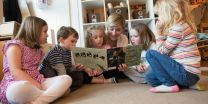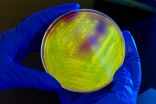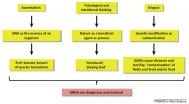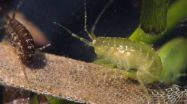(Press-News.org) Dropping off a child at kindergarten for the first time can be one of the most memorable yet terrifying experiences of parenthood. Among the many concerns parents face is the worry whether your child will make friends - a key factor, research shows, in reducing anxiety, depression and the likelihood of being bullied.
For parents of children with disabilities, the concern is even greater as four-out-of-10 of their children will enter kindergarten without the social skills necessary to develop close friendships. The response from schools has been to create inclusive classrooms, where a significant number of students with disabilities now receive the majority of their education and are believed to have a better chance at developing close relationships with peers.
But after studying six inclusive classrooms, Lori Erbrederis Meyer, assistant professor of early childhood and early childhood special education at the University of Vermont, has found that inclusive classrooms with disability awareness curricula alone do not increase friendships for students with disabilities. Her study, forthcoming in Topics in Early Childhood Special Education and available now via the journal's OnlineFirst service, also showed that having a best friend helps children with high rates of problem behaviors and low rates of social skills still gain peer acceptance.
"The fact that about 40 percent of young children with disabilities will enter kindergarten without age-appropriate social relationship skills is striking, because these skills help them form friendships, which in turn supports smoother transitions in kindergarten and may prevent later peer victimization," says Meyer, a former inclusive early childhood teacher herself. "We found that inclusion in and of itself does not equate to increased acceptance, classroom membership or peer relationships. This research emphasizes the importance of individualizing class-wide programs based on children's support needs."
Investigating the impact of a disability-focused curriculum
In her article, "Impact of an Affective Intervention on the Friendships of Kindergarteners with Disabilities," Meyer investigates a disability awareness curriculum's impact on the development of close friendships among 26 kindergarteners with disabilities enrolled in six inclusive classrooms. She also looked into whether the presence of at least one best friendship mediated the relationship between children's social skills/problem behaviors and peer acceptance.
The study compared the results of two groups, each containing students with and without disabilities. In one group, classroom teachers implemented the "Special Friends" program, a curriculum designed to increase children's positive attitudes about disabilities. In the other, teachers implemented a curriculum with a focus on science. Each program included class-wide shared book reading, mixed-ability cooperative learning groups where students egnaged in play-based activities with one another, and a lending library, allowing children to bring books read at school home to read with their families.
The Special Friends program read books with a focus on disability-related themes, with teachers discussing the book's plot, connections between the children and the characters in the books, understanding of disabilities and disability-specific vocabulary. Teachers using the science program led shared book reading in a very similar way, except that they read books with science-related content.
"Contrary to our hypothesis that the number of best friendships would increase in the Special Friends program, we found a significant increase in the number of best friendships for children with disabilities participating in the science program," Meyer says.
There was, the study notes, one important difference between the cooperative learning groups' activities in Special Friends versus the science curriculum. While the former encouraged open-ended, dramatic play -- like pretending to run a restaurant -- the latter worked on project-based activities that had clearly defined outcomes -- like working together to build a bird's nest.
"Evidence shows that children in the Special Friends program may not have had the play skills necessary to engage in extended, independent play interactions during the cooperative learning group activities," Meyer says. "Some of the children weren't sure how to initiate interactions. This may account for the group's decline in the mean number of best friendships."
Other findings showed that self-regulation and social skills are directly related to having at least one best friend and acceptance among peers. "Children who had higher rates of problem behavior and lower social skills also had lower rates of peer acceptance," Meyer says. "However, when children with these social-behavioral characteristics had a best friendship, it did not result in lower peer acceptance scores."
Meyer says that to increase the chances of children with disabilities making friendships, high-quality inclusion models must be structured in a way that creates an environment that supports young children's acceptance, membership and the development of friendships.
"Our research shows that at the same time we're focusing on improving children's social skills and decreasing their challenging behaviors, we also have to be helping them make friends in the classroom because of the protective factors that it has and its effect on producing better social and academic outcomes." she says. "Within our early learning environments we need to think deeply about how we create opportunities for children to grow in both their academic and social skills. This is especially prevalent for children who may enter kindergarten with delays or disabilities that may impact their social-emotional development and impact their ability to develop close friendships with classmates."
INFORMATION:
A new technique that identifies how genes are controlled could help scientists spot errors in the genetic code which trigger disease, a study suggests.
The method focusses on those parts of DNA - known as enhancer regions - which regulate the activity of genes and direct the production of proteins that have key functions within the body.
Errors in protein production can result in a wide range of diseases in people, researchers say.
The new method could help researchers pinpoint the source of disease-causing mutations in enhancers. Until now, these genetic errors ...
ANN ARBOR, Mich. -- Nearly half of American hospitals aren't taking key steps to prevent a kind of gut infection that kills nearly 30,000 people annually and sickens hundreds of thousands more - despite strong evidence that such steps work, according to a new study.
While nearly all of the 398 hospitals in the study use a variety of measures to protect their patients from Clostridium difficile infections, 48 percent haven't adopted strict limits on the use of antibiotics and other drugs that can allow the dangerous bug to flourish, the researchers report.
Hospital ...
This news release is available in German. The world is a risky place. But our subjective fears and anxieties are often at odds with the evidence. New findings by scientists at the Max Planck Institute for Human Development and the University of Konstanz show that subjective fears about potential risks may be amplified in social exchange. Their findings have now been published in the journal Proceedings of the National Academy of Sciences (PNAS).
In our information society, information about risks such as Ebola and measles can spread like wildfire - be it through ...
A team of Belgian philosophers and plant biotechnologists have turned to cognitive science to explain why opposition to genetically modified organisms (GMOs) has become so widespread, despite positive contributions GM crops have made to sustainable agriculture. In a paper published April 10 in Trends in Plant Science, they argue that the human mind is highly susceptible to the negative and often emotional representations put out by certain environmental groups and other opponents of GMOs. The researchers urge the general public to form opinions on GMOs on a case-by-case ...
DURHAM, N.C. -- Orphaned children in low- and middle-income countries face a high risk of trauma, with physical and sexual abuse being by far the most prevalent traumatic events.
New research shows that orphaned boys in these settings are just as likely to experience abuse as girls. As a result, the study authors suggest targeting more support services and prevention programs toward protecting vulnerable boys.
Researchers from Duke University and the University of North Carolina at Chapel Hill found that physical and sexual abuse affects 12 percent of girls and 14 ...
Thinking "time is money" can be a barrier for people to act in environmentally friendly ways, even for tasks like recycling that take mere seconds, according to UBC research.
As Earth Day approaches on April 22, this dynamic has led to an unsettling outcome.
"Putting a price tag on time leaves individuals to focus on their own needs and goals, as opposed to the needs and goals of others, including the environment," says Ashley Whillans, PhD student in UBC's Department of Psychology and lead author of a paper on the subject.
In one of the paper's studies, a group of ...
The gold standard for analyzing the behavior of fusion plasmas may have just gotten better. Mario Podestà, a staff physicist at the U.S. Department of Energy's Princeton Plasma Physics Laboratory (PPPL), has updated the worldwide computer program known as TRANSP to better simulate the interaction between energetic particles and instabilities - disturbances in plasma that can halt fusion reactions. The program's updates, reported this week in the journal Nuclear Fusion, could lead to improved capability for predicting the effects of some types of instabilities in future ...
Negative feedback can sting, but thinking about the big picture may help transform criticism into positive change, according to new research published by the Society for Personality and Social Psychology.
"People are defensive when they are told about something they did wrong," said lead researcher Jennifer Belding, Ph.D., from Ohio State University. "Listening to negative feedback requires self-control because you have to get past the fact that hearing it hurts and instead use the information to improve over time."
In three experiments, researchers found that ...
24.4.2015: Gigantic volumes of hot material rising from the deep earth's mantle to the base of the lithosphere have shaped the face of our planet. Provided they have a sufficient volume, they can lead to break-up of continents or cause mass extinction events in certain periods of the Earth's history. So far it was assumed that because of their high temperatures those bodies - called mantle plumes - ascend directly from the bottom of the earth's mantle to the lithosphere. In the most recent volume of Nature Communications, a team of researchers from the Geodynamic Modeling ...
A new study of the complex interplay between organisms and their environment shows that biodiversity--the variety of organisms living on Earth--is even more important to the healthy functioning of ecosystems than previously thought.
The findings bolster the view that conservation of biodiversity benefits the plants and animals directly involved, and by extension the human populations that rely on these organisms and ecosystems for food, water, and other basic services.
Lead author on the study, to be published in the online journal Nature Communications on April 24, ...



